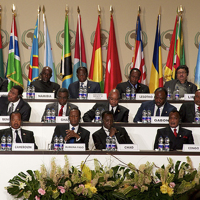After a groundswell of anti-government protests enveloped many corners of North Africa a year ago, observers around the world began to wonder how far this democratic contagion would spread. In particular, many wondered whether northern Africa would inspire its neighbors in sub-Saharan Africa, which share many of the same demographic characteristics found in the Middle East and North Africa (MENA), including a large percentage of unemployed young people, high food prices and years of oppression and unrealized opportunity at the hand of often-brutal dictators. At the time, political commentators in several corners of Africa seemed optimistic that the Arab Spring would indeed spread southward.
Sure enough, in a continent marred by decades of dictatorship, military coups and fraudulent elections, sub-Saharan Africa in 2011 witnessed an unprecedented number of parliamentary and presidential elections -- in 17 countries -- as well as the creation of a new state, South Sudan. On Dec. 11, Cote d’Ivoire elected a parliament for the first time in more than a decade. The elections, though easily won by President Alassane Ouattara’s party after followers of former President Laurent Gbagbo decided to boycott, were nevertheless noticeable for the absence of deep violence and conflict that engulfed last year’s presidential election.
Unlike what happened in Kenya in 2007 and Cote d’Ivoire in 2010, most of the countries that held elections earlier this year witnessed peaceful transfers of power. In April, Nigeria, despite logistical difficulties and the postponement of presidential elections, boasted one of the least violent, most credible elections in recent decades. Since taking office, President Goodluck Jonathan has completed a number of reforms and surrounded himself with a credible cabinet and team of advisers, including Harvard-educated Finance Minister Ngozi Okonjo-Iweala. While the radical Islamist group Boko Haram has orchestrated several deadly bombings in the months following Nigeria’s elections, one could argue that their ramped-up efforts are a direct response to the deeper democratic consolidation that is taking hold. In November, Liberia managed to hold a successful election in a relatively calm atmosphere, despite the opposition candidate’s boycott of the second-round run-off election.

